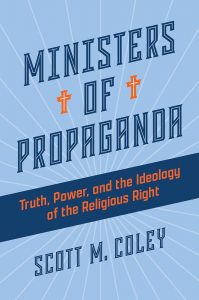Celebrity preachers, entrepreneurial theologians, parachurch leaders and conservative pundits have sold millions of Americans a false gospel that legitimizes discriminatory social arrangements, argues Scott Coley in his provocative book, Ministers of Propaganda: Truth, Power, and the Ideology of the Religious Right.

Scott Coley
“Good evangelical Christians are Republican. It seems like it’s always been this way. That means the propaganda is working,” he writes. “What interests me is ideology’s capacity to shape the beliefs and practices of those under its spell without their knowledge, and perhaps even in opposition to their own stated desires.”
Coley, a lecturer in philosophy at Mount St. Mary’s University, says the “scandal of the evangelical mind” Mark Noll described 30 years ago has been amplified by the scandal of evangelical political engagement, which instead of seeking justice seeks to reinforce racial and gender hierarchies by claiming whites deserve more wealth than Blacks and men should rule over women.
The anti-Christian ideology of the Religious Right is “facilitated by propaganda that manipulates political, intellectual or religious ideals in order to preempt dissent and silence” those who disagree, he claims.
“Much of what’s described as evangelical deconstruction is essentially an effort to decode propaganda that’s embedded in the ideology of the Religious Right.”
Coley says it’s this powerful propaganda — not Christ’s gospel — that leads many to question or abandon their faith: “I contend that much of what’s described as evangelical deconstruction is essentially an effort to decode propaganda that’s embedded in the ideology of the Religious Right.”
Propaganda comes in many forms and involves the selective use and presentation of information and misinformation in order to advance or harm an agenda, person or institution. The form of propaganda Coley highlights is “rhetoric that appropriates an ideal in order to perpetuate intellectual or social practices that contradict that very ideal.”
Examples from race relations and creation science — two topics the book explores at length — reveal the deception and effectiveness of this pervasiveness form of propaganda.
“I have a dream that my four little children will one day live in a nation where they will not be judged by the color of their skin but by the content of their character,” said Martin Luther King Jr. in his 1963 “I Have a Dream” speech.
Coley says politically conservative white evangelicals have appropriated King’s dream of equality and turned it on its head so they can continue to profit from their economic advantages over Blacks. Today, the Religious Right employs King’s dream as a weapon to oppose the changes King called for with their attacks on diversity, equity and inclusion and Critical Race Theory.
He writes: “The white evangelical appropriation of ‘colorblind’ rhetoric is a form of propaganda, insofar as it invokes the ideal of racial equality in service to a social and political agenda that perpetuates racial inequality. … According to the logic of color blindness, race matters only to racists, and the way to avoid being a racist is to be blind to race, or ‘colorblind.’”
“The white evangelical appropriation of ‘colorblind’ rhetoric is a form of propaganda.”
Coley claims the “creation science industry” doles out a double dose of propaganda: “Creation scientists advance ostensibly biblical and scientific claims while avoiding substantive engagement with either biblical scholarship or legitimate science.”
The deception is intentional, Coley writes: “Creation science is an organized framework for casting doubt on scientific conclusions that pose a threat to the allegedly biblical view of creation. … Marketing itself as a scientific enterprise, the creation science movement invokes the intellectual ideals associated with scientific rigor — but does so only in order to further an agenda that denies the reliability of research conducted according to those very ideals, while promoting research that violates them.
 “Evangelicals who have been thusly conditioned do not distrust all science. They visit the doctor and take their cholesterol medication. They use GPS navigation and ride on airplanes. They ask Siri. They trust science when it’s convenient. Yet when expert consensus threatens the interests of the Religious Right, evangelical theology furnishes an endless supply of ‘biblical’ narratives that justify skepticism of ‘secular’ expertise.”
“Evangelicals who have been thusly conditioned do not distrust all science. They visit the doctor and take their cholesterol medication. They use GPS navigation and ride on airplanes. They ask Siri. They trust science when it’s convenient. Yet when expert consensus threatens the interests of the Religious Right, evangelical theology furnishes an endless supply of ‘biblical’ narratives that justify skepticism of ‘secular’ expertise.”
Coley also goes into great detail to disprove one of the propagandistic claims of the creation science movement — that its young-earth views represent the historic consensus of Bible-believing Christians.
Ministers of Propaganda argues that the Religious Right is under the sway of an ideology he calls Christo-authoritarianism that “presses the resources of Christian theology into the service of authoritarian social and political objectives,” including efforts to suppress voting by the wrong kinds of people.
But Coley concludes that Christ’s true gospel offers many antidotes to propaganda in all its forms, as well as a better way to think about Christians’ political responsibilities that he calls the “justice-oriented paradigm” of political engagement.
“Evangelicals can and should resist these forces by actively questioning the legitimacy of social hierarchies that privilege our interests above those of our neighbors,” he writes. “… When we engage in politics, our aim should be to bring our laws and policies into conformity with the truths about what people deserve and what we owe each other.”
Related articles:
The Christian Right continues its futile but dangerous war of reaction | Opinion by David Gushee
A brief introduction to progressive Christianity | Opinion by Martin Thielen
Politics, faith and mission: A talk with Tim Alberta on his book and faith journey | Opinion by Greg Garrett


